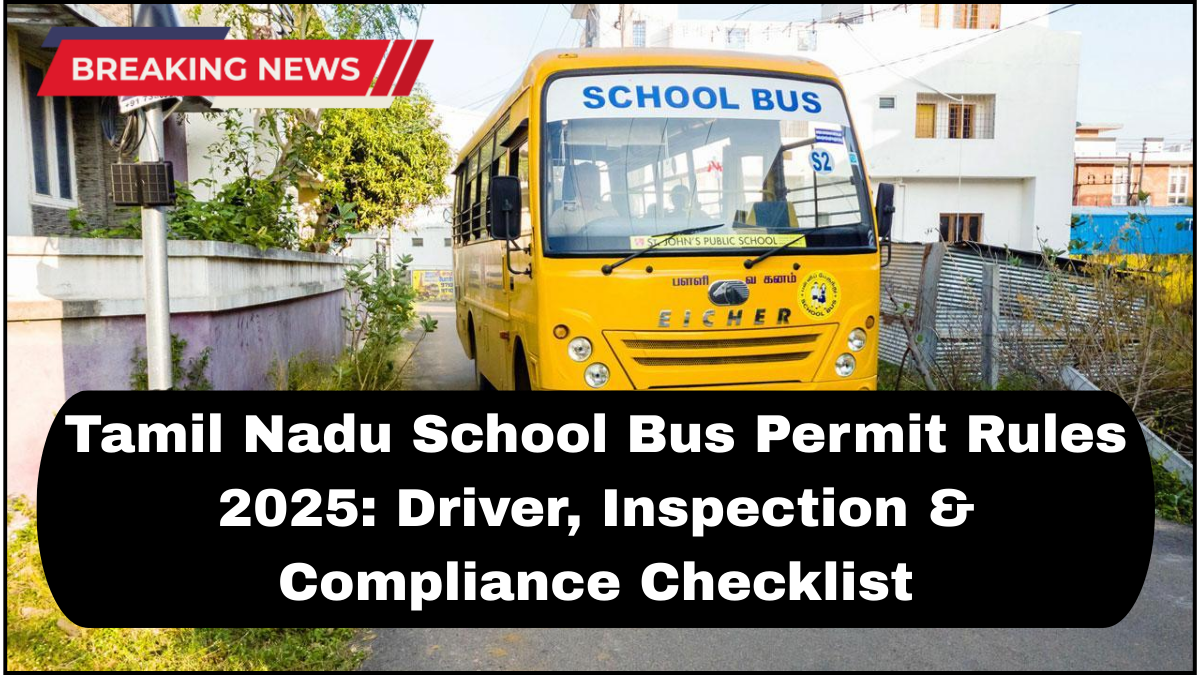The School Bus Permit Rules 2025 Tamil Nadu introduce a comprehensive framework for ensuring the safety and compliance of school transportation systems across the state. With a focus on enhanced vehicle standards, driver qualifications, and strict inspection protocols, the updated regulations reflect the government’s commitment to student safety.
Here’s a detailed breakdown of the updated rules, including what school authorities, bus operators, and drivers need to know in order to stay compliant in 2025 and beyond.

What’s New in the 2025 School Bus Permit Rules?
The 2025 revision introduces tighter controls and clearer responsibilities for stakeholders in school transport. The core goals are:
-
Ensuring student safety through standardized procedures
-
Minimizing operational risks with proper inspections
-
Enforcing accountability from school management and transport operators
-
Streamlining the permit and renewal process via digital records
H3: Driver Qualification and Responsibilities
Under the School Bus Permit Rules 2025 Tamil Nadu, driver qualification requirements have been significantly reinforced.
Mandatory Criteria:
-
Minimum Age: 30 years
-
Experience: At least 5 years of driving experience with a valid Heavy Motor Vehicle (HMV) license
-
Background Check: Police verification is mandatory. Drivers must have a clean criminal record, especially with no offenses involving children or reckless driving.
-
Medical Certification: Annual medical fitness certification, including vision and cognitive tests, is now required.
-
Training Program: Drivers must undergo a state-approved school bus safety training module, which includes child behavior management, road safety, and emergency protocols.
New Responsibility Guidelines:
-
Strict adherence to designated pick-up/drop-off points
-
Prohibition on overloading or carrying unauthorized passengers
-
Immediate reporting of any safety incidents or mechanical issues
-
No usage of mobile phones or hands-free devices while driving
These changes elevate the professionalism expected of school bus drivers and ensure the highest levels of safety for students.
H3: School Bus Vehicle Inspection & Safety Checklist
The updated rules mandate a detailed vehicle inspection protocol prior to permit issuance and during annual renewals.
Inspection Points Include:
-
Structural Integrity: No rust, cracks, or loose fittings
-
Seat Safety: All seats must have proper cushioning and seat belts (mandatory for all new buses)
-
Speed Governor: Functional and set not to exceed 40 km/h
-
CCTV Cameras: At least one operational camera inside the bus
-
First-Aid Kit: Stocked and checked monthly
-
Fire Extinguishers: Easily accessible and recently serviced
-
Emergency Exits: Clearly marked and fully functional
-
GPS Tracking: Mandatory GPS devices to be linked to a central monitoring dashboard accessible to school authorities and transport officials
Annual inspections are conducted by designated Regional Transport Offices (RTOs), and random spot-checks may also be carried out during the academic year.
H3: Permit Application and Renewal Process
Applying for or renewing a school bus permit in Tamil Nadu in 2025 requires the submission of a detailed compliance file:
-
Application Form: Filled and signed by the bus owner or school administrator
-
Driver Documents: Valid license, training certification, and police verification
-
Vehicle Documents: Registration Certificate (RC), fitness certificate, pollution under control (PUC) certificate, and insurance
-
Inspection Report: Verified and signed by an RTO officer
-
Affidavit: Declaring compliance with all school bus regulations, signed by both operator and school principal
The process has now been partly digitized through the Tamil Nadu Transport Department’s portal, allowing online uploads and status tracking.
H3: Penalties for Non-Compliance
Failure to comply with the School Bus Permit Rules 2025 Tamil Nadu can result in serious consequences:
-
Permit Suspension or Revocation
-
Heavy Fines (ranging from ₹10,000 to ₹1,00,000 based on severity)
-
Blacklisting of Vehicle or Operator
-
Prosecution in case of gross negligence or endangerment
Repeated violations may lead to permanent disqualification from operating school transport services in the state.
H3: Responsibilities of Schools and Operators
Schools are not merely passengers in this process—they are accountable.
-
Regular Safety Audits: Conduct internal checks monthly
-
Parent Communication: Share transport protocols and emergency contacts
-
Staff Monitoring: Appoint a transport coordinator to ensure daily compliance
-
Record Maintenance: Maintain logs of driver rosters, GPS data, and vehicle servicing
Operators who lease buses to schools are equally responsible for meeting all compliance standards. Joint accountability is now enforceable under the 2025 framework.
Frequently Asked Questions (FAQs)
Q1. Is it mandatory to install GPS tracking on all school buses?
Yes, GPS tracking is compulsory and must be linked to the school’s monitoring system for real-time location tracking and route management.
Q2. Can a driver with only three years of HMV experience be eligible?
No. As per the 2025 rules, a minimum of five years of experience is mandatory, along with training and a clean record.
Q3. What happens if a school bus fails its annual inspection?
The permit will be withheld or revoked until the vehicle passes a follow-up inspection after addressing the issues found.
Q4. Are electric school buses included in the new rules?
Yes. Electric buses must also meet all the standard safety and inspection protocols under the same framework.
Q5. How often should the fire extinguisher and first-aid kit be checked?
Fire extinguishers should be serviced every six months, and first-aid kits should be inspected monthly for completeness and expiration of supplies.
click here to learn more